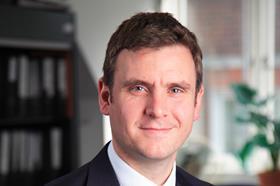But lawyer warns starting the second phase of the line three years early may not be possible

Contractors have welcomed HS2 chair David Higgins’ newly-announced plans to speed up the delivery of HS2.
Today Higgins set out his plans for speeding up the project including delivering the line’s second phase three years earlier; change the design of HS2’s Euston terminus and scrap a £700m link to HS1.
Alasdair Reisner, director of external affairs for the Civil Engineering Contractors Association, said he supported plans to speed up delivery of the line that would be “central to Britain’s transport infrastructure for generations to come”.
He said: “However, HS2 must not be built at the expense of other projects. Instead, it should be seen as a foundational to the diverse portfolio of transport and energy projects we will need to construct if we our national infrastructure is to meet the demands of the 21st century.
“For this reason we welcome Sir David Higgins’ demand for additional focus on delivering wider transport in the North, above and beyond those provided by HS2.”
Mike Putnam, UK chief executive of contractor Skanska, said the report was “wise.”
“We need national and local support for this scheme, and holding this [launch] event in Manchester was a statement, and it’s been interesting to see the strength of support here from across the north,” he said
However, Malcolm Dowden, consultant at law firm Charles Russell LLP, warned the new timetable may not even be possible.
He said: “It is unlikely that the current legislation could be extended without fatally slowing its progress, as HS2 requires parliamentary approval and the legislation that is due for its second reading in late April could not easily be amended to authorise the northern elements of HS2.
“In practice, acceleration of the northern stages would require wholly separate legislation and with only limited Parliamentary time before the next election it is far from clear that the government will treat an extra HS2 Bill as a priority. The economic case is likely to come a poor second to the constraints of the legislative process.”
Duncan Symonds, head of infrastructure at consultant WSP, said redeveloping Euston was “an obvious win”.
But he said: “The issue of the HS1 link is slightly trickier. We can see the benefits of a link but more analysis is needed into whether there will be the demand to warrant and sustain it, and how international passport control facilities would be incorporated into current designs.
“We’ll be watching this issue develop with interest because from our internal debates on the matter it’s clear that there are a number of extremely complex issues to be balanced and addressed.”
Richard Threlfall, head of contruction at KPMG, said: “Higgins here has shown he’s one of the best politicians in the country, delivering a report which has the strength and leadership not to falsely claim cost savings that will be difficult to deliver.
“Hopefully now we can finally get froma numbers game to a real debate about policy and investment.”
Patrick Twist, transport partner at law firm Pinsent Masons, said Higgins’ message that “the longer it takes the more it costs” was “well understood in the construction industry but to-date government has preferred to spread the cost over a longer period”.
He added: “Sir David recognises that currently proposed HS1-HS2 rail link is sub-optimal and he calls for it to be reconsidered. Few would argue with that but businesses in Birmingham and the North will look for this link to be upgraded so that it can provide effective and efficient through services to the continent.”
Twist said it was “prudent” to not seek to reduce the contingency for HS2 at this stage”.
He added: “He has rightly made clear that any material reduction in cost will be dependent on the length of time the parliamentary process takes.”
Paul Plummer, director of Network Rail group strategy, said the scheme would “reshape reshape the railway in a way that incremental improvements simply cannot”.
He added: “The step-change in capacity that HS2 enables across the network as a whole will transform the service on existing lines, creating the space we need to meet growing demand and deliver new and better connections.
“The timetables that might operate are by no means fixed and we will soon announce a programme of engagement with passengers and stakeholders, both inside and outside the industry, to seek their views on what should be prioritised as we start to plan future services.”


























No comments yet